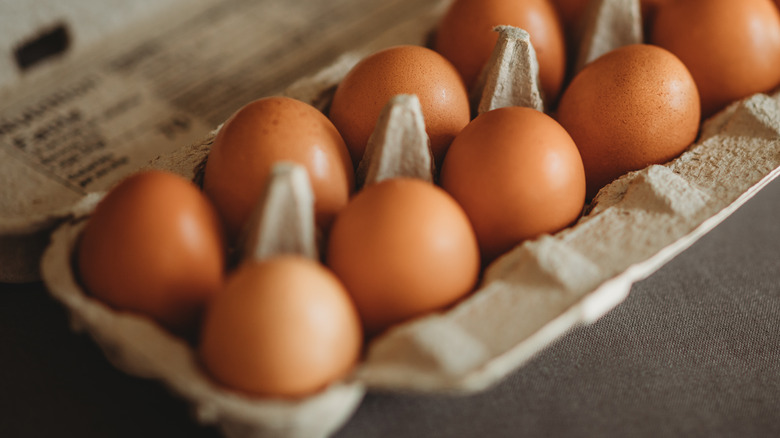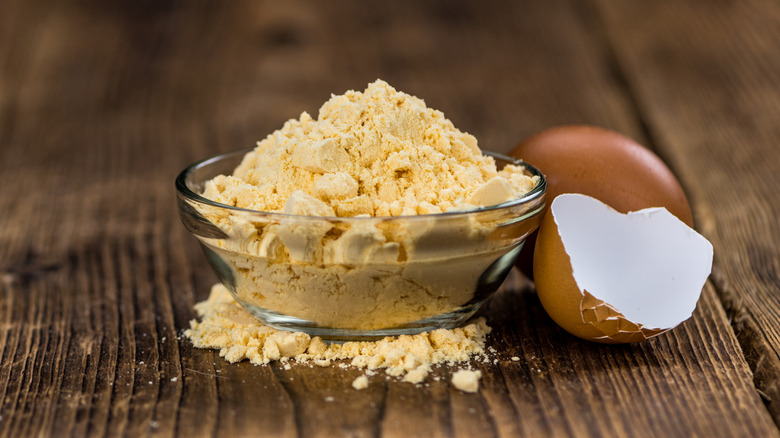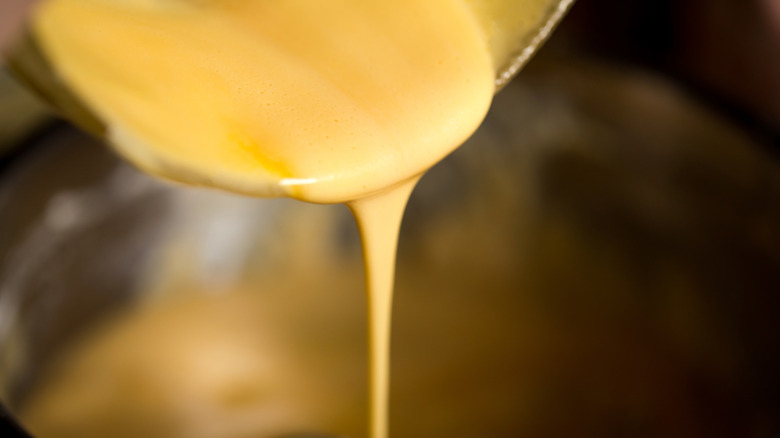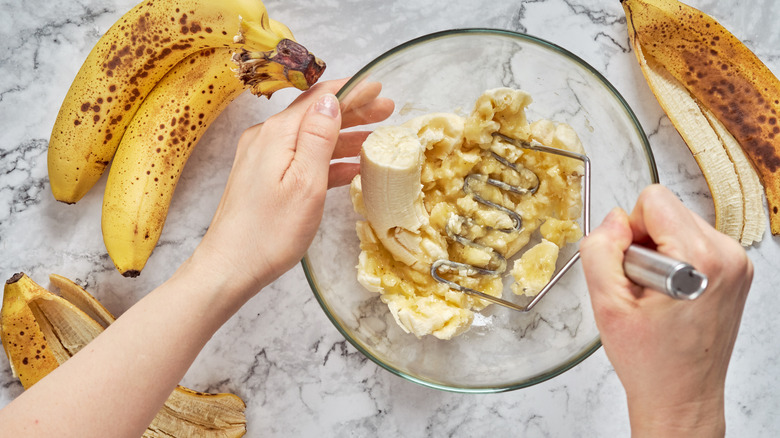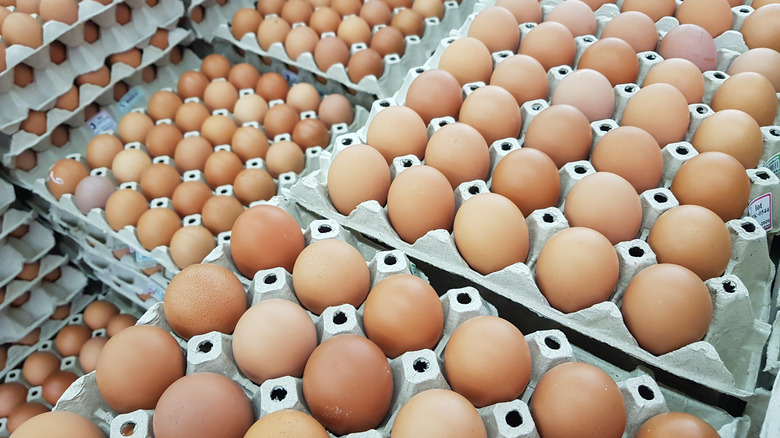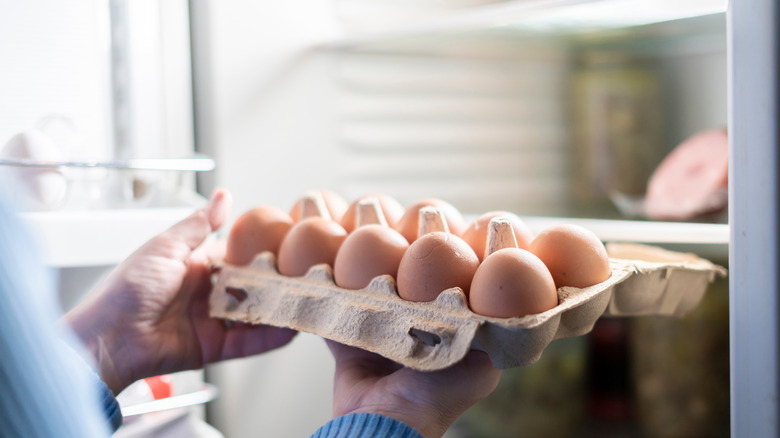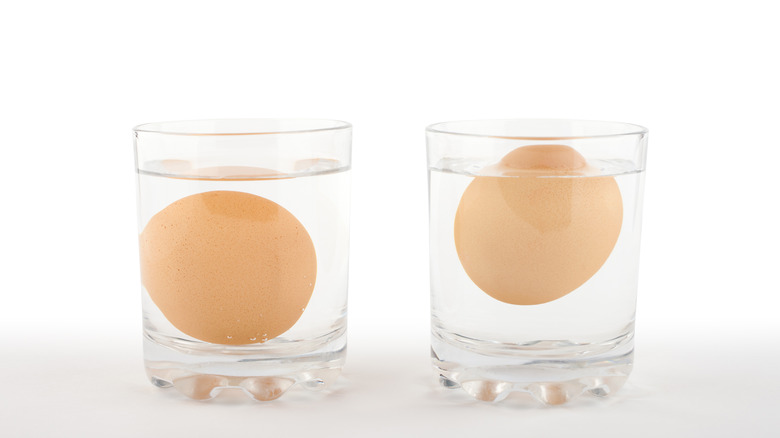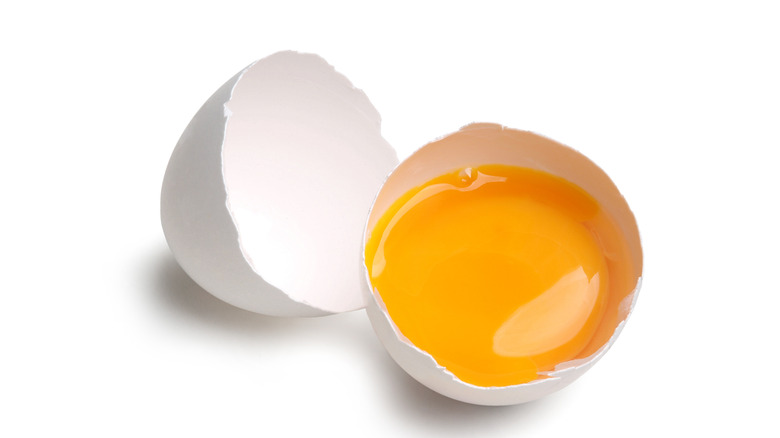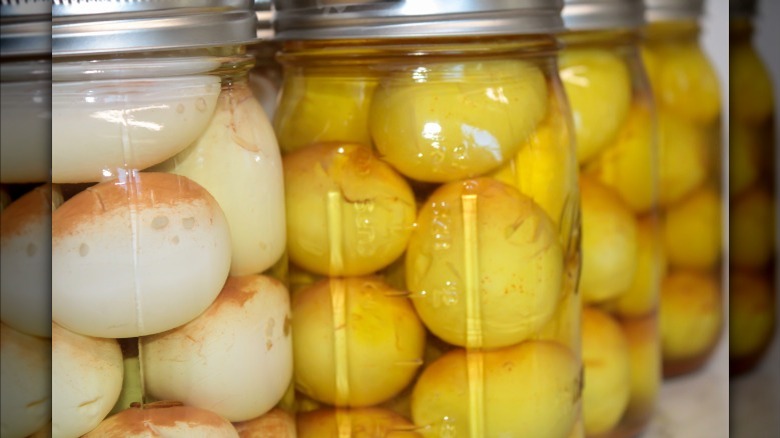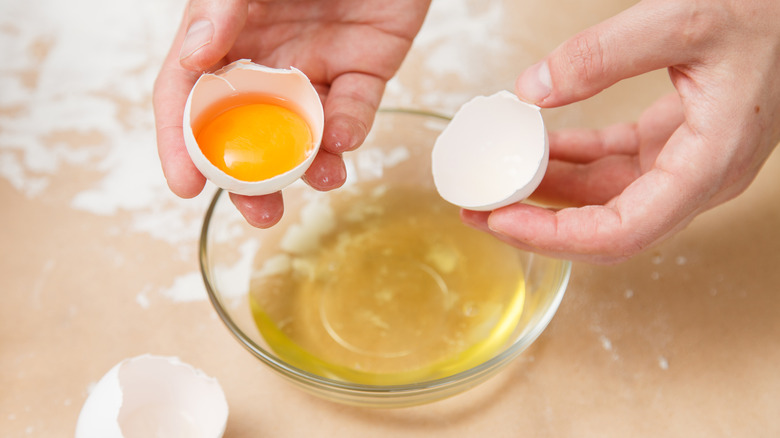12 Ways To Offset The Increasing Cost Of Eggs
We may receive a commission on purchases made from links.
From breakfast omelets to baked goods, eggs play a vital role in our kitchens. And they aren't just delicious and versatile — eggs also have countless health benefits. They are a great source of protein, vitamins, nutrients, and antioxidants. Eggs are also loaded with HDL, or good cholesterol, and reduce LDL, or bad cholesterol, as explained by Healthline.
Unfortunately, with the recent egg price hikes, many are rethinking their grocery lists. According to CNN Business, data collected by the Bureau of Labor Statistics shows that egg prices jumped 49% from November 2021 to November 2022. This is out of proportion with the prices of other groceries, which on average increased by only by 12%, per CNBC. Most experts are blaming avian flu, which hit the U.S. in February 2022, killing more than 50 million birds including egg-laying hens (via Reuters). Other factors that have exacerbated the situation include an increase in energy and feed costs as well as high consumer demand.
While some are anticipating that egg prices will decrease this year, as reported by Food Business News, there's no escaping the fact that many households are feeling the pinch. If the skyrocketing cost of eggs is cutting into your grocery budget, here are a few creative ideas to offset the burden.
1. Use powdered eggs
Just like their name suggests, powdered eggs are dehydrated eggs that come in the form of a powder. Similar in consistency to powdered milk, powdered eggs can be made from entire eggs or just egg whites or yolks — all you have to do is pick the type required by the recipe, as noted by Delighted Cooking. According to Convert To, one tablespoon, or 0.2 ounces, of egg powder equals one average egg. This means that one pound of egg powder — which will set you back around $30 — can replace around 80 eggs. And with a dozen eggs reaching up to $18, it's easy to see why investing in powdered eggs makes a lot of sense (via The Guardian).
Aside from saving you money when egg prices are at their peak, powdered eggs are superior to regular eggs in a number of other ways. Firstly, egg powder doesn't need to be refrigerated. Secondly, it has an ultra-long shelf life. In fact, if stored correctly in a sealed container, powdered eggs won't spoil for up to nine years. And just like fresh eggs, powdered eggs are a rich source of protein and calcium (via Livestrong). This being said, some brands add flavor to their powdered eggs by combining them with vegetable oil or milk powder, which alters the powder's nutritional content.
2. Give liquid eggs a go
Also sometimes called breaker eggs, liquid eggs have been pasteurized, homogenized, and poured into cartons. Conveniently, you can buy liquid eggs in three forms: liquid whole eggs, liquid egg whites, and liquid egg yolks. And while they can't be turned into boiled or poached eggs, liquid eggs can be used in pretty much any recipe. As a rule of thumb, you need to use four tablespoons of liquid eggs to replace one large egg. Be sure to always consult the box for more details before embarking on your culinary adventure (via Cake Decorist).
So how does the price of liquid eggs compare to that of real eggs? At publishing time, 32 ounces of Egg Beaters liquid egg product — the equivalent of around 20 eggs — will set you back a little over $7. Considering the current prices of eggs, this is an absolute bargain. In case you're not already sold, most unopened liquid egg cartons can be kept in the fridge for around 70 days. In addition, just like real eggs, liquid eggs can be frozen to extend their shelf life to around a year, as per Sunny Fresh.
3. Try cooking with egg substitutes
Why not view the egg price hike as an opportunity to get creative with your recipes? Particularly since there are plenty of cheap and easy-to-find egg alternatives right there on the supermarket shelves. After all, it's no secret that vegans and those allergic to eggs have been successfully substituting eggs in their recipes for years.
Eggs serve a number of purposes in cooking. Aside from adding flavor to recipes, they also add moisture, help bind ingredients, and act as a leavening agent that helps baked goods rise in the oven, as per Happy Egg Co. Luckily, you can easily accomplish these functions with ingredients other than eggs. And there's plenty to choose from.
Mashed bananas, pumpkins, avocados, or sweet potatoes make great substitutes for eggs. Not only do they all taste great, but have a high nutritional content. Be sure to mash them thoroughly before use to avoid any stringy membranes in your recipe. If you don't mind an earthy or slightly nutty twist in your meal, you can also substitute eggs with ground flaxseeds or chia seeds. And if you have nothing else on hand, adding vegetable oil and water or vinegar and baking soda to your recipe can also do the trick.
4. Buy eggs in bulk
According to research by MagnifyMoney, shopping in bulk can reduce your grocery bills by an average of 25%, provided that the products don't expire before you get the chance to use them. In this case, eggs are no exception. Money Smart Family reports that buying five dozen eggs at once in some stores can reduce your bill by around 20%.
Addressing the recent egg price hikes, WFMY News 2 has done the calculations for you. And the news platform definitely recommends buying in bulk, especially since eggs can be kept in the refrigerator for up to five weeks. After looking at egg prices in several popular Greensboro stores, WFMY News 2 highlights that while six eggs at Walmart cost $2.82 or 47 cents per egg, buying 36 eggs at the same store reduces this cost to 37 cents per egg. According to the news website, the most affordable online egg offer in Greensboro on January 12, 2023, was $6.99 for a 30-egg carton at Harris Teeter.
5. Look for lower grade eggs
Not all eggs are created equal. And if you don't care about aesthetics, lower-grade eggs generally offer better value for money. According to the USDA, eggs are classified into three grades depending on their appearance and quality. Grade AA eggs come with thick whites and blemish-free shells. Grade A eggs are very similar to their grade AA counterparts except they come with slightly thinner whites and flatter yolks as well as slight cosmetic defects on the shells. Meanwhile, grade B eggs can be abnormal in shape and slightly stained and usually come with thinner whites and flatter yolks.
No matter the grade, all eggs sold in the U.S. come with unbroken shells and the same nutritional value. However, while grade AA and grade A eggs are usually found in stores, grade B eggs are commonly turned into liquid and powdered eggs. Nevertheless, since the grading system is often used to set prices, it pays to keep an eye out for lower-grade options (via Insider). And while you may not be able to find grade B eggs in all supermarkets, some do stock them. In addition, according to Money Smart Family, some stores, such as Kroger, have been repackaging eggs from broken dozens and labeling them grade B.
6. Buy specialty eggs
Overall, the smaller farms behind organic eggs haven't been as badly affected by the avian flu as their larger counterparts. This is because commercial farmers have been forced to manage outbreaks by culling hens at the first sign of disease (via Business Insider). This isn't surprising since avian flu kills between 90 and 100% of birds within days, as reported by the Centers for Disease Control and Prevention.
According to the biggest egg producer in the U.S., Cal-Maine Foods, the average price of a dozen specialty eggs rose to $2.37 in the last fiscal quarter of 2022 while the price of regular eggs increased to $2.88 in the same period. This, in turn, increased the sales volume of Cal-Maine's specialty eggs by 24% and decreased the sales volume of standard eggs by 2% in the quarter ending November 26, 2022.
Backyard poultry enthusiasts have also felt the effects of the price hikes — in a good way. For example, the Pophals family of Merrill, Wisconsin has been raising chickens for the past three years. Before the price increase, they often ended up with more eggs than they could consume, offloading them on friends and family members. Today, they sell their surplus eggs for around three dollars per dozen and even have a waiting list for their produce (via WEAU 13 News).
7. Make sure your eggs are appropriately stored
You may be surprised by the fact that many grocery stores across the world don't refrigerate eggs. There's a good reason for this, as The New York Times explains. Unlike some other countries, the U.S. requires farmers with more than 3,000 chickens to wash their eggs in an attempt to prevent the spread of disease. Interestingly, the practice has the very opposite effect. Washing eggs removes their cuticles, which is a thin layer that protects eggs from bacteria.
If appropriately refrigerated, eggs will stay fresh for up to five weeks. After this point, they start losing their color, flavor, and texture, as per Egg Cartons. To keep eggs in tip-top shape as long as possible, store them at slightly below 40 degrees Fahrenheit. And while you may be tempted to place your eggs in the specifically-designated compartment inside the fridge door, this isn't the best strategy since it subjects them to temperature fluctuations. Instead, try to keep your eggs on a refrigerator shelf and in their original carton since this minimizes moisture loss (via Incredible Egg).
In addition, storing your eggs upside-down, or with the pointed side at the bottom, will make them last longer because the air bubble at the round side of each egg centers the yolk. Once you crack your eggs open, never return the shells to the carton since this can contaminate the other eggs with bacteria (via Allrecipes).
8. Don't discard your eggs too early
Eggs are surprisingly resilient. And even though they may deteriorate over time, appropriately stored eggs rarely go bad. In fact, refrigerated eggs are more likely to dry up than spoil (via Incredible Egg). According to the USDA, even eggs that reach their sell-by date, are still safe for consumption. As Women's Health points out, the expiration date on egg boxes is meant to alert grocery stores that they need to replace their stock rather than tell you that the eggs are off.
While shelled eggs can be kept in the fridge for weeks, this is not the case once you crack them open. As a rule of thumb, if refrigerated, raw egg yolks and whole eggs should be used within two days. Meanwhile, raw egg whites should be consumed within four days. There're multiple ways of telling when it's time to ditch your eggs. A fresh egg should have a neutral smell. If the egg smells rotten, it probably is. In addition, any signs of mold or slime are a sure sign that an egg has reached its use-by-date. If in doubt, do the float test. If the egg sinks when placed in water, it's good to go. If it floats, however, you may want to rethink your options.
9. Freeze your eggs
If you find yourself with more eggs than you can consume — particularly if you buy them in bulk — you can always freeze them for later use. In fact, you can keep eggs in your freezer for up to a year.
To freeze eggs, remove them from their shells and beat them until the yolks and whites are blended (you can also freeze yolks and whites separately). Next, pour the mixture into sealable freezer containers. There's an additional step you'll need to take if freezing egg yolks. Since egg yolks thicken when frozen, they can become overly gelatinous for use in cooking. To reduce the likelihood of this happening, mix the yolks with either 1½ teaspoon of sugar or corn syrup or ⅛ teaspoon of salt per four yolks, as per The Incredible Egg.
Don't forget to label each container with basic information including the number of eggs, whites, or yolks (and whether they contain sugar or salt), as well as the storage date. And when it comes to packaging the eggs, Herb Stockschlaeder, the Director of R&D at Rosina Food Products, makes the following suggestion: "If you're someone who has the freezer space, and you like two over-medium eggs every morning for breakfast, break them into snack baggies, put them in your freezer. [...] The snack baggies tear right open, and you can put them in your pan from frozen" (via WKBW).
10. Pickle your eggs
Pickling not only preserves eggs but also infuses them with flavor. Once ready, pickled eggs can be eaten on their own as a snack or as an addition to salads, deviled eggs, and other dishes. Used to preserve eggs before we had refrigerators, pickling can extend the shelf life of hard-boiled eggs from one week (in the shells) to up to four months, as noted by the Foods Guy.
Pickled eggs are also ultra-easy to prepare. Simply boil the eggs, peel them, and submerge them in a boiling concoction of vinegar, sugar, and other ingredients such as garlic, peppercorns, fennel seeds, as well as fresh thyme and tarragon. Once sealed, the jars should be stored in a cool and dark place for at least a week before opening. Whereas opinions on whether the sealed jars have to be kept in the fridge vary, once opened for consumption the eggs should always be refrigerated.
According to the NCHFP, it's best to pickle small to medium-sized eggs to ensure that the seasoning penetrates them. While some recipes call for pricking each egg to speed up the process, the Foods Guy advises against this practice if you want to extend the life of your pickled eggs. A tight seal on the jar is crucial to ensuring that your eggs don't go bad.
11. Save egg whites and yolks for later use
Many recipes only call for egg whites or egg yolks, leaving you with a surplus of the other half. And with the price of eggs being what it is, it's definitely a good idea to save your egg whites and yolks for future culinary endeavors instead of throwing them out. Unfortunately, since cracked eggs only last up to two days in the fridge before spoiling, keeping them from going bad requires a little creativity.
The most obvious way of preserving your egg whites and yolks for future use is to freeze them. Thrifty Fun recommends pouring each egg white or yolk into an ice cube tray slot prior to popping them in the freezer to make them easier to portion later. This being said, remember to add a tiny portion of sugar or salt to the yolks to prevent them from thickening.
If you find yourself with leftover yolks or eggs, you can also expand your menu. Short on ideas? Tasting Table offers a plethora of recipe suggestions for spare egg yolks including using them in baked goods, pastry dough, custard, and homemade ice cream. Egg whites, on the other hand, can be used to make meringue, mousse, macarons, and marshmallows. And if all else fails, they can also be added to cocktails (via BBC Goodfood).
12. Switch to plant-based eggs
When it comes to egg substitutes, the future has never looked this bright. Not satisfied with powdered and liquid eggs, some companies are taking things to the next level with plant-based eggs. In fact, TechCrunch projects that the global plant-based egg industry will be worth $800 million by 2027, rising by 27% year-on-year.
One venture that makes plant-based — and more specifically mung-bean-based — egg products is JUST Egg. And with egg price increases causing havoc, Bloomberg reports that the sales of JUST Egg plant-based eggs rose by around 17% in 2022. Some other notable plant-based egg product companies include Hodo, which makes soy-based scrambled eggs, and Neat, which produces eggs made from chia seeds and chickpeas.
Last year, the Israeli company Yo! Egg developed whole plant-based poached and fried eggs — a world first. Made from plant-based proteins, sunflower oil, and flour, the eggs are completely cholesterol-free. However, unlike real eggs, which contain around 5-6 grams of protein, they only contain 1 gram of protein, per Healthline. Yo! Egg, which launched the eggs in the U.S. at the National Restaurant Association Show in May last year, is planning to gradually introduce its product across the country (via Engadget).
